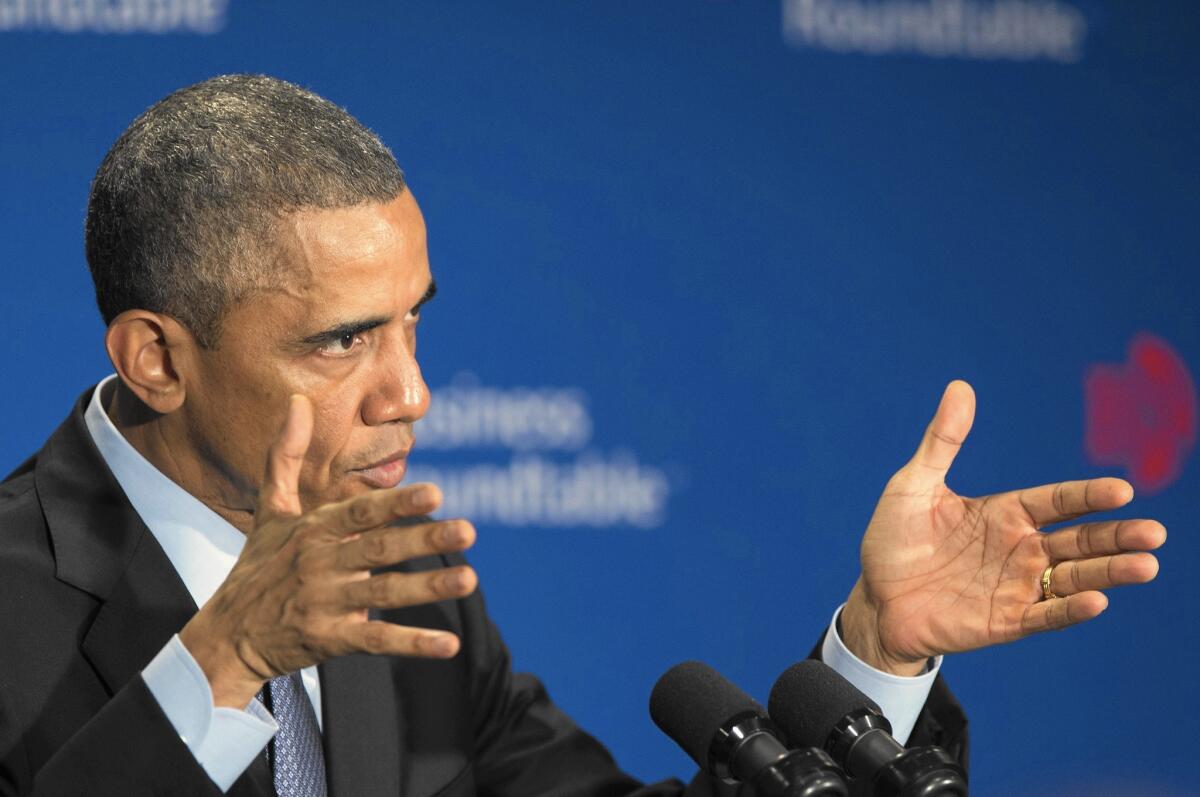House approves one-year extension of $45 billion in tax breaks

- Share via
reporting from WASHINGTON — The House overwhelmingly approved a one-year extension of $45 billion in tax breaks, mostly for businesses, after bipartisan efforts on a longer-term extension fell apart close to deadline.
The Senate is expected to follow suit in the coming days so companies and individuals will be able to deduct costs in dozens of categories from this year’s taxes.
“With the end of the year and a new tax filing season rapidly approaching, we need to act,” said House Ways and Means Committee Chairman Dave Camp (R-Mich.), who preferred extending the temporary breaks for a longer period and making some permanent.
The breaks expired Dec. 31, 2013, but the practical effects would not be felt until tax returns are filed next year. A vote to extend them was needed by the end of this month.
The legislation, approved by a 378-46 vote Wednesday, makes the breaks retroactive through the end of this calendar year so they can be claimed by tax filers.
Among the extended breaks would be a key provision for homeowners, first enacted in 2008, that exempts from taxes as much as $2 million in forgiven mortgage debt for people who received aid from banks to avoid foreclosure.
The expired business provisions include the widely used research and development tax credit and another break for so-called bonus depreciation that allows businesses to increase the amount of the cost of capital purchases they can write off in the year they are made.
But some business tax breaks are narrowly targeted, including one that benefits Hollywood. The provision allows qualifying movie and TV productions to write down the first $15 million of expenses.
Other breaks help owners of racehorses and NASCAR tracks. Also among the 51 expired provisions to be extended are several energy production tax credits, including one for wind and biodiesel.
Despite the bipartisan vote, Republicans and Democrats lamented that they once again were providing a short-term extension of breaks that routinely expire.
Business groups were disappointed as well.
“It’s just unworthy of the world’s greatest economy to have a tax code for two weeks, which is basically what we get with a one-year extension,” said John Engler, president of the Business Roundtable trade group. “And then in January, it’s all expired again.”
Congress will take another shot at a longer-term extension next year with Republicans holding a stronger hand after winning control of the Senate and adding to their House majority in the midterm elections.
Executives have warned that the uncertainty over the tax breaks is hindering investment in their businesses. Some Republicans argued that point in pushing to make many of the tax provisions permanent.
“A one-year extension is not that great a deal for families, individuals and businesses,” said Sen. Orrin G. Hatch (R-Utah). “But it’s far better than letting these provisions lapse entirely.”
The Senate passed legislation this year that extended the tax breaks through 2015. But House Republicans passed their own bill that permanently extended some of the expired provisions despite Democratic concerns that it favored business breaks over those for average Americans.
In recent weeks, Senate Majority Leader Harry Reid (D-Nev.) tried to negotiate a deal with House Republicans to make many of the expired tax provisions permanent at a cost of about $440 billion over the next decade.
But President Obama threatened to veto any such agreement because he said it would be too tilted toward business tax breaks.
Obama and many Democrats want to include extensions of some breaks that help working-class Americans, including the earned income tax credit, which doesn’t expire until the end of 2017.
“I want to make sure that working-class families get a fair shake,” Senate Finance Committee Chairman Ron Wyden (D-Ore.) said.
Reid indicated this week that he was open to allowing a vote on the bill the House passed.
Obama told executives Wednesday that he’d like to include discussions about longer-term extensions of some of the tax breaks, particularly the research and development credit, as part of a comprehensive corporate tax overhaul.
But he said that longer extensions of tax breaks for working families, like the earned income tax credit, would have to be included in a broader tax overhaul.
“So there are going to be some working-class and middle-class working family provisions that have to be incorporated if we are to extend some of these other tax deductions and tax breaks as well,” Obama told the Business Roundtable trade group.
He expressed “cautious optimism” that Democrats and Republicans can agree on a corporate tax overhaul, but work needs to begin soon before a limited window closes as the 2106 presidential election approaches.
There is general agreement on the need to eliminate some business tax breaks and to lower the 35% corporate tax rate, which is the highest among advanced economies.
“There is definitely a deal to be done,” Obama said.
He cited “two big hurdles” to striking a deal.
Executives will have to be willing to give up some tax breaks. And Obama said the desires of some Republicans to try to overhaul the individual tax code at the same time could make it harder to come to an agreement.
“My view is that if we start with the corporate side, it’s a more discrete problem, fewer variables, fewer moving parts,” Obama said.
“We may be able to get that done, and then we can potentially have a conversation about broader tax reform,” he said. “That may not be how the Republicans view the situation. And that could end up being a hang-up.”
More to Read
Inside the business of entertainment
The Wide Shot brings you news, analysis and insights on everything from streaming wars to production — and what it all means for the future.
You may occasionally receive promotional content from the Los Angeles Times.











